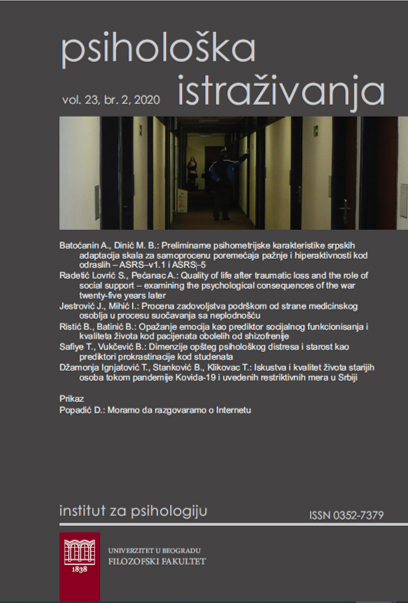Dimenzije opšteg psihološkog distresa i starost kao prediktori prokrastinacije kod studenata
Dimensions of general psychological distress and age as the predictors of procrastination in university students
Author(s): Teodora Safiye, Branimir VukčevićSubject(s): Psychology
Published by: Филозофски факултет, Универзитет у Београду
Keywords: procrastination; depression; anxiety; stress; students;
Summary/Abstract: The aim of the study is to examine whether depression, anxiety, stress and age are significant predictors of procrastination. Procrastination can be defined as the intentional postponement of the beginning or the completion of a task or job, leaving it for later, despite the knowledge of the negative consequences ofsuch an act. The assumption was that with a higher degree of depression, anxiety and stress, the degree of general procrastination would be higher, and that, with higher age, the degree of procrastination would be lower. The sample consisted of 338 students of both sexes (282 female), the average age of 23.53. The following instruments were used: The General Procrastination Questionnaire (GPS: Lay, 1986), Depression, Anxiety, and Stress Scale (DASS-21: Lovibond & Lovibond, 1995), and Questionnaire on socio-demographic data designed for the purposes of this research. Standard multiple regression analysis was used for data analysis. Data were collected during the state of emergency due to the COVID-19 pandemic, and hence the paper also presents the findings on the degree of general psychological distress and procrastination in students. The results show that, in the female subsample, only depression is a significant predictor that explains 6% of the variance of procrastination (s = 0.36, p <0.01). This implies that, in female students, depression, including sadness, hopelessness, devaluation of themselves and theirlives, strengthens procrastination, but also vice versa. The results of the research did not confirm the initial assumption that the older the students were, the better they knew how to cope with procrastination.
Journal: Psihološka istraživanja
- Issue Year: 23/2020
- Issue No: 2
- Page Range: 187-200
- Page Count: 14
- Language: Serbian

